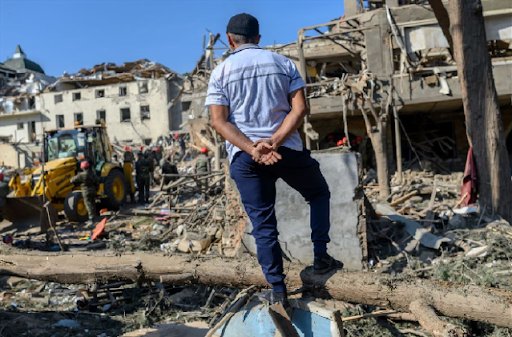Karabakh War leaves its Civilians in Shock and Despair

Heavy fighting has erupted in the Nagorno-Karabakh conflict as Russia tries to shore up a ceasefire agreed by Armenia and Azerbaijan last weekend.
Azerbaijan says it has destroyed missile sites inside Armenia which it claims were used to target civilian areas, and its president has said military operations are continuing.
Nagorno-Karabakh is internationally recognised as part of Azerbaijan, but the enclave is controlled by ethnic Armenians.
The tree-lined main street of Ganja, Azerbaijan's second-largest city, was bathed in morning sunlight and carpeted in glass. Just behind it a cluster of apartment blocks had been ripped open like tin cans.
Ganja lies 100km (62 miles) from the frontlines of Nagorno-Karabakh, but on Sunday, the first full day of a shaky ceasefire - that wasn't far enough.
Azerbaijan accused Armenia of firing a ballistic missile at a residential part of Ganja. Armenia accused Baku of shelling civilians.
60-year-old Nushabe Haiderova in her headscarf and slippers, with a cardigan over her night clothes. Her arms were slack with shock said, "This is how I ran out, with only what I was wearing,". "We barely escaped. It was horrible."
We picked our way through the debris in her damaged home, to the bedroom where her grandchildren had been sleeping. Their injuries were minor. But now a new generation - on both sides - is being scarred by this decades-old conflict. At times it feels like a mirror image.
"Armenians should leave peacefully," she said. "We don't want war. We just want to free our own motherland."
People here view Nagorno-Karabakh as a missing piece of their territory. That is both an article of faith and a well-rehearsed national narrative, which has the backing of the international community.
At 22 years old, Ihtiyar Rasulov has never set foot in the disputed mountain region. But the clean-shaven young man, with a boy-band look, says he's ready to die to get it back. When we met in Azerbaijan's capital, Baku, he had just signed up to fight.
"I am ready to fight for my nation and my motherland with my soul and my blood," he said earnestly. "My father, my mother and my grandfather lived in those areas. My brother is fighting right now."
Ihtiyar lives in a rundown housing complex teeming with families who fled Nagorno-Karabakh, and surrounding areas, during the war in the early 1990s. He has been raised on the folk memory of lost land, atrocities and historic enmity with Armenia. It has been bred in the bone. That goes for many here.
"Karabakh is Azerbaijan," he said. "Armenians came there and they did a lot of bad things to our nation. Of course, I haven't witnessed it, but I have heard about it."
He also said he agreed with whatever Azerbaijan's President, Ilham Aliyev, had to say. In this tightly controlled country - where the presidency was passed from father to son - you hear that a lot.
One of Ihtiyar's neighbours rushed to show me his veteran's identity card. Asef Haqverdiyev, balding and animated, fought in the war for Nagorno-Karabakh last time around.
"I am 51 now," he said, "and I am ready to die for my country.
"I have sent my own son to the war, and he is fighting at the border. Even if my family dies, even if everyone dies, we are not willing to give one inch of our land."
We got a similar message from a grandmother in the frontline city of Terter. Despite rounds of shelling back and forth, Aybeniz Djaffarava refused to leave, though she did move underground. We found her in a makeshift shelter with several relatives, including her six-month old grandson Fariz, cradled in her arms.
"We have been waiting for this for 28 years," she told me, smiling in the half light.
"We are very excited about what's happening. My son and daughter are fighting on the frontline. We are staying in the shelter to wait for victory day and move to our land."
Few here expect the Russian-brokered ceasefire to last. Many don't want it to. Their troops have already recovered some areas alongside Nagorno-Karabakh. They have been primed for a victory on the battlefield and want their president to stick to his guns.















































